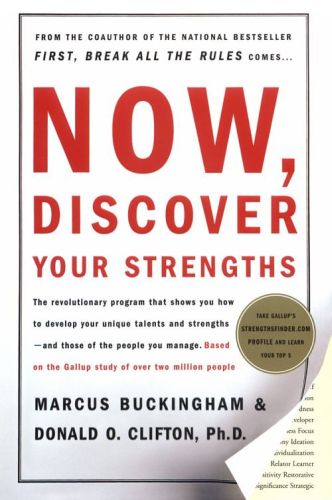What are your really awesome at? What would those around you identify as your strengths? Have you ever considered asking those closest to you to help you choose 5 areas that are your greatest strengths? Do you spend more time working on your strengths or weaknesses?
I would recommend that all leaders go through Now, Discover Your Strengths by Marcus Buckingham and Dr. Donald Clifton. In addition to reading the book, you should also go online and take the StrengthsFinder assessment. This is a great tool to find out more about your own strengths so that you can really lean into what you are good at…rather than wasting a lot of time working on areas that might always be weaknesses. This is a minor time commitment…I read the book in 2 hours and completed the assessment in just over 20 minutes. However, I walked away from the process with a much better understanding of why I am good at what I’m good at…and just as valuable, why the others around me are so good at what they are good at. I look forward to utilizing this info to continue growing as a leader and investing in those around me.
My five greatest strengths were identified as: learner, achiever, belief, responsibility, and discipline
Here are several things that I highlighted while reading…
- At the heart of this revolution is a simple decree: The great organization must not only accommodate the fact that each employee is different, it must capitalize on these differences.
- Each person’s talents are enduring and unique.
- Each person’s greatest room for growth is in the areas of his or her greatest strength.
- The real tragedy of life is not that each of us doesn’t have enough strengths, it’s that we fail to use the ones we have. Benjamin Franklin called wasted strengths “sundials in the shade.”
- The definition of a strength that we will use throughout this book is quite specific: consistent near perfect performance in an activity.
- For an activity to be a strength you must be able to do it consistently.
- You do not have to have strength in ever aspect of your role in order to excel.
- You will excel only by maximizing your strengths, never by fixing your weaknesses.
- The first revolutionary tool is understanding how to distinguish your natural talents from things you can learn.
- The key to building a bona fide strength is to identify your dominant talents and then refine them with knowledge and skills.
- The second revolutionary tool is a system to identify your dominant talents.
- The third revolutionary tool is a common language to describe your talents.
- There are two types of knowledge: content and experience.
- Skills bring structure to experiential knowledge.
- Talent is any recurring pattern of thought, feeling, or behavior that can be productively applied.
- If you want to reveal your talents, monitor your spontaneous, top-of-mind reactions to the situations you encounter.
- By focusing on your distinct themes, you will gain the self-confidence to appreciate the themes of other people.
- A system that stops your worrying about a weakness is freeing up time that can be better spent figuring out how to refine a strength.
- You will be most successful when you craft your role to play to your signature talents most of the time.
- “At work, do I have an opportunity to do what I do best every day?”
- Build your selection system around an instrument for measuring talent.
- Calibrate your instrument by studying your best performers in each key role.
- Teach the talent language throughout the organization.
- Build a theme profile of your entire company.
- Study the links between measured talent and subsequent performance.
- Many kinds of prestige should be made available to reflect the different near perfect performances the organization wants to encourage.

